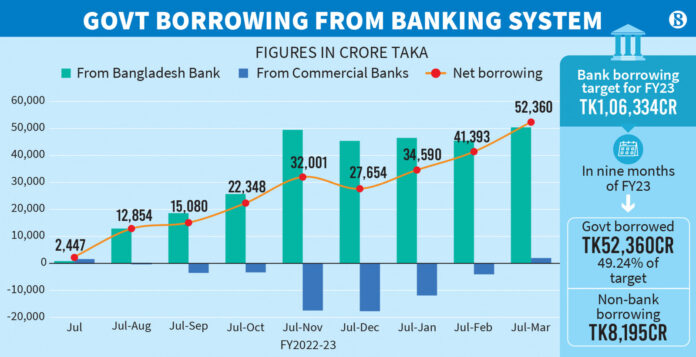The government’s reliance on commercial banks for funding has increased significantly in recent months, driven by slow revenue growth and a downturn in private sector credit demand.
With the central bank halting direct financing through new currency issuance, the government has few options left but to turn to commercial banks to fulfill its fiscal requirements.
By mid-April of the fiscal year 2024–25, government borrowing from commercial banks had risen to Tk 98,579.21 crore, showing an almost 60 percent increase from Tk 61,616 crore during the same period last year, according to Bangladesh Bank data.
Despite this sharp rise, net borrowing from the banking system stood at Tk 42,248 crore, slightly lower than the Tk 46,355 crore recorded a year earlier.
Net bank borrowing is calculated by subtracting the amount the government has repaid to the Bangladesh Bank from what it has borrowed. Between July and April 16 of this fiscal year, the government repaid Tk 56,331 crore to the central bank.
The government typically borrows through treasury bills and bonds, and until the previous fiscal year, it also borrowed directly from the Bangladesh Bank. However, this practice was halted after strong criticism from economists and policymakers, who warned that printing money amid persistently high inflation would only exacerbate rising prices.
A senior official from the central bank, speaking on the condition of anonymity, told The Daily Star that the government had little choice but to turn to commercial banks after the central bank withdrew from direct lending. “With tax revenue falling short of expectations, the government has become increasingly dependent on the banking sector to cover its budget deficit,” the official explained.
Internal data from the National Board of Revenue (NBR) show that revenue collection grew by only 2.76 percent during the first nine months of FY25. By March, the NBR, which contributes 86 percent of the state’s total revenue, had collected Tk 256,486 crore, well below the revised target of Tk 463,500 crore.
Meanwhile, private sector demand for credit has dropped, due to high interest rates and political uncertainty. This has resulted in banks holding surplus liquidity and investing more in government securities, according to industry insiders.
Credit demand in the private sector has come to a near halt, hitting its lowest point since at least 2004, signaling a difficult business and investment environment. Private sector credit growth stood at 6.82 percent in February this year, down from 7.15 percent the previous month, according to Bangladesh Bank data.
Syed Mahbubur Rahman, managing director and CEO of Mutual Trust Bank, stated, “Banks are now heavily invested in government treasury bills and bonds as credit demand in the private sector wanes.”
Mustafizur Rahman, distinguished fellow at the Centre for Policy Dialogue (CPD), also remarked that the government’s borrowing needs are expected to rise in the current quarter, explaining the increased reliance on bank loans.



